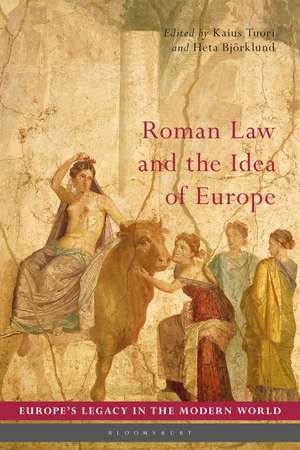Roman Law and the Idea of Europe: Europe’s Legacy in the Modern World
Editat de Dr Kaius Tuori, Dr Heta Björklunden Limba Engleză Paperback – 24 iun 2020
Preț: 225.77 lei
Preț vechi: 258.33 lei
-13% Nou
Puncte Express: 339
Preț estimativ în valută:
43.21€ • 44.83$ • 36.11£
43.21€ • 44.83$ • 36.11£
Carte tipărită la comandă
Livrare economică 17-31 martie
Preluare comenzi: 021 569.72.76
Specificații
ISBN-13: 9781350170230
ISBN-10: 1350170232
Pagini: 304
Ilustrații: 6 bw illus
Dimensiuni: 156 x 234 x 19 mm
Greutate: 0.42 kg
Editura: Bloomsbury Publishing
Colecția Bloomsbury Academic
Seria Europe’s Legacy in the Modern World
Locul publicării:London, United Kingdom
ISBN-10: 1350170232
Pagini: 304
Ilustrații: 6 bw illus
Dimensiuni: 156 x 234 x 19 mm
Greutate: 0.42 kg
Editura: Bloomsbury Publishing
Colecția Bloomsbury Academic
Seria Europe’s Legacy in the Modern World
Locul publicării:London, United Kingdom
Caracteristici
Contributions by world-renowned historians, including Stefan Berger, Bo Stråth and Johann Chapoutot, as well as emerging scholars from the UK, Italy, Finland, France and Germany
Notă biografică
Kaius Tuori is University Lecturer in European Studies at the University of Helsinki, Finland. He is the author of The Emperor of Law: The Emergence of Roman Imperial Adjudication (2016) and Lawyers and Savages: Ancient History and Legal Realism in the Making of Legal Anthropology (2014). He is also the co-editor, with Paul J du Plessis and Clifford Ando, The Oxford Handbook of Roman Law and Society (2016).Heta Björklund has a PhD in Classics from the University of Helsinki, Finland. She has previously worked as an editor at the Classical journal Arctos.
Cuprins
List of FiguresList of ContributorsAcknowledgementsIntroduction: Roman Law and the Idea of EuropeKaius Tuori, University of Helsinki, Finland1.The Impact of Exile on Law and Legal Science 1934-1964Magdalena Kmak, University of Helsinki, Finland2.Exiled Romanists between Traditions: Pringsheim, Schulz and DaubeKaius Tuori, University of Helsinki, Finland3.Francis de Zulueta (1878?1958): An Oxford Roman Lawyer between TotalitarianismsLorena Atzeri, Università degli Studi Milano, Italy4.Autonomy and Authority: The image of the Roman Jurists in Schulz and WieackerJacob Giltaij, University of Helsinki, Finland5.Roman Law after 1917: A Stateless Lawyer in Search of ByzantiumDina Gusejnova, The University of Sheffield, UK6.The Denaturalization of Nordic Law: Germanic Law and the Reception of 'Roman Law' Johann Chapoutot, Institut d'Histoire du Temps Présent, France7.The Idea of Rome: Political Fascism and Fascist (Roman) LawCosimo Cascione, University of Naples, Italy8.'Byzantium!' - Bona Fides between Rome and 20th-Century GermanyHans-Peter Haferkamp, University of Munster, Germany9.The Arduous Path to Recover a Common European Legal Culture: Paul Koschaker, 1937?1951Tommaso Beggio, University of Trento, Finland10.The Weakening of Judgment: Johan Huizinga (1872?1945) and the Crisis of the Western Legal TraditionDiego Quaglioni, University of Trento, Finland11.Roman Law as Wisdom: Justice and Truth, Honour and Disappointment in Franz Wieacker's Ideas on Roman LawVille Erkkilä, University of Helsinki, Finland12.Conceptions of Roman Law in Scots Law: 1900-1960Paul Du Plessis, University of Edinburgh, UK13.The Search for Authenticity and Singularity in European National History Writing, 1800 to the PresentStefan Berger, Ruhr University Bochum, Germany14.A Genealogy of Crisis: Europe's Legal Legacy and OrdoliberalismBo Stråth, University of Helsinki, FinlandIndex
Recenzii
This lively and learned collection of essays on Roman law in the twentieth century deserves a wide readership. The authors bring home the profound ideological significance of Roman law in modern European history, in essays of fundamental importance for students of fascism and liberalism alike.
This excellent book explores the impact of politics and history on a generation of scholars' interpretations of Roman law and reinterprets these scholars' personal histories in the light of this crisis. It throws considerable light on an important episode of cultural transmission and exchange, and will be of great importance to political, intellectual, and legal historians.
This excellent book explores the impact of politics and history on a generation of scholars' interpretations of Roman law and reinterprets these scholars' personal histories in the light of this crisis. It throws considerable light on an important episode of cultural transmission and exchange, and will be of great importance to political, intellectual, and legal historians.









